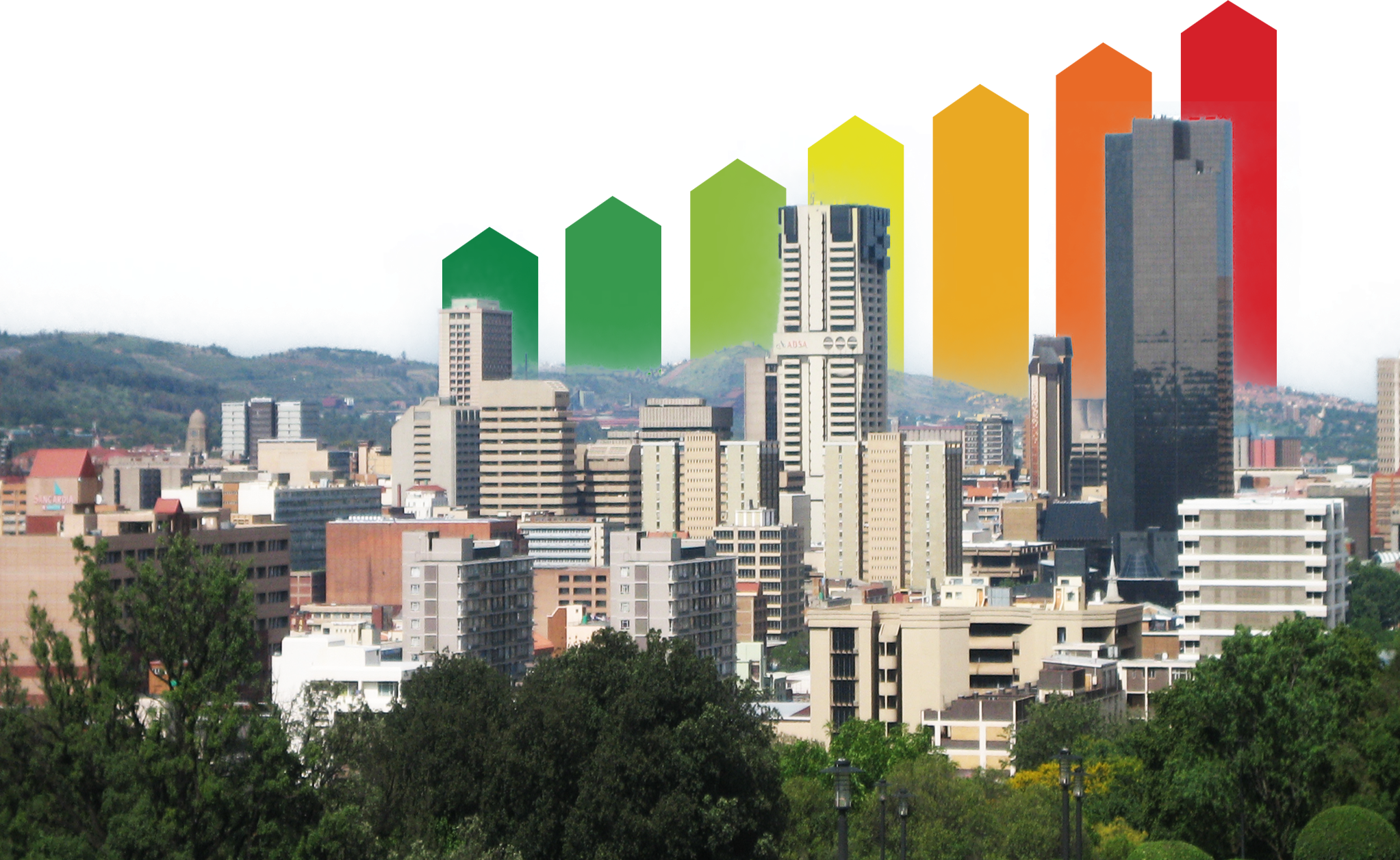Frequently Asked Questions (FAQs)
-

What is an Energy Performance Certificate (EPC) and why does my building need one?
An Energy Performance Certificate (EPC) measures how efficiently a building uses energy, with ratings from A (most efficient) to G (least efficient).
In South Africa, EPCs are a legal requirement for certain public and private buildings and must be publicly displayed by December 2025, in line with SANS 1544 and SANS 10400-XA standards.
Beyond compliance, EPCs give property owners credible performance data that improves operational efficiency, strengthens ESG reporting, and enhances investor and tenant confidence.
👉 Read our latest article on how EPCs are reshaping sustainability globally here.
-

How can GreenBDG help my diverse asset portfolio comply with ESG reporting requirements?
Integrate smart metering & digital dashboards to capture energy, water, and waste data.
Conduct carbon footprint analysis (Scope 1 & 2, with Scope 3 support where relevant).
Align reporting with global frameworks (GRI, SASB, TCFD, CDP) for investor confidence.
Link building performance to Net Zero Carbon pathways and certification targets.
Provide portfolio-wide compliance tracking, ensuring consistency and comparability across assets.
-

What makes GreenBDG Africa different from other sustainability consultancies?
GreenBDG Africa combines tech-enabled compliance intelligence, Africa-first design, and stakeholder-led deliveryin one integrated platform.
Unlike traditional consultancies, we bring together green building certifications, real-time resource data diagnostics, and ESG advisory—ensuring compliance, performance, and impact are addressed simultaneously.
Our track record includes award-winning projects, cross-sector dialogue through our Green Café forums, and scalable tools that align with both African regulations and global ESG standards.
-

What are the benefits of green certification tools in infrastructure planning?
Green certification tools provide a credible framework for improving energy, water, and material efficiency while embedding resilience from the outset. They:
Ensure compliance with local and global sustainability standards.
Unlock investor confidence by aligning with ESG reporting and green finance requirements.
Drive performance through measurable reductions in operating costs and carbon footprint.
Future-proof assets against tightening regulations and climate risks.
At GreenBDG Africa, we’ve applied tools like Green Star SA, EDGE, Net Zero Carbon, LEED, and SANS 10400-XA—together with smart metering analytics—to help partners shift from tick-box compliance to climate leadershipacross public and private infrastructure.
-

Can you help us improve our building’s water usage in our daily operations?
A: Absolutely. We provide end-to-end solutions, including:
Water audits to identify inefficiencies and risks.
Smart metering for real-time monitoring and leak detection.
Greywater reuse and rainwater harvesting designs to cut potable demand.
Green lease clauses to align landlord–tenant responsibilities.
Our approach is backed by hands-on implementation and insights from our Green Café forums, where industry peers share best practices.
👉 Here’s a short video showing how we’re helping clients across sectors embed water resilience into daily operations.
-

Do you work outside of South Africa?
Yes, we do.
GreenBDG Africa has successfully led projects and provided technical advisory in countries such as Botswana, Ghana, Kenya, Uganda, Tanzania, Rwanda, and beyond.
We help clients across the continent advance climate-resilient infrastructure, energy optimisation, and ESG capacity building, combining regional insight with hands-on implementation experience to deliver measurable impact in every engagement.
-

Which countries require mandatory energy performance certificates?
South Africa
Private offices > 2,000 m²; Public buildings > 1,000 m²
Occupancy: Offices (G1), Learning & gathering (A1–A3)
Deadline: 7 Dec 2025
Non-compliance: Fines up to R5m / director imprisonment
Must be issued by SANEDI-accredited professionals & publicly displayed
Other Countries
EU (all states): Required under EPBD for sales, rentals, major renovations; display in public buildings >250 m²
UK: Required for sale, rent, construction; public buildings >250 m² must display
Ireland, France, Portugal, Denmark, Germany, Turkey: Same as EU rules
China: EPCs apply to certain building types, expanding nationally
-

Are ESG reporting regulations mandatory?
ESG reporting regulations are increasingly becoming mandatory across the globe, though the extent depends on the jurisdiction. In South Africa, JSE-listed companies are already required to disclose ESG matters through integrated reporting under the King IV Code, while private companies are not yet legally bound but are under growing investor and supply-chain pressure.
The European Union has introduced the Corporate Sustainability Reporting Directive (CSRD), making ESG reporting compulsory for large companies and listed SMEs between 2024 and 2028.
Similarly, the United Kingdom requires large and listed companies to provide climate-related disclosures aligned with TCFD, while in the United States, the SEC’s new Climate Disclosure Rule obliges public companies to report climate-related risks and emissions.
Other countries such as Japan, Australia, Singapore, Hong Kong, Brazil, and India have also established mandatory ESG or climate reporting frameworks, particularly for listed or large entities.
Globally, the trend is clear: ESG reporting is shifting from voluntary good practice to a regulatory requirement, businesses face increasing expectations from regulators, financiers, and stakeholders to adopt transparent ESG disclosures..
-

Explain the link between mandatory EPCs and ESG reporting?
Mandatory EPCs generate the hard performance data that ESG reporting requires. They bridge compliance obligations with strategic sustainability reporting, helping companies move from tick-box regulation to value-adding ESG performance.
The Link in Practice
Mandatory EPCs create standardized, trusted data on building performance, which property owners and managers can plug directly into their ESG reports.
For real estate portfolios, EPC data can be aggregated into portfolio-level energy intensity metrics, feeding into sustainability ratings (GRESB, CDP, PRI) and investor reports.
In South Africa, where EPC compliance is due by December 2025, property managers can leverage this regulatory requirement to also strengthen their ESG disclosures and meet rising investor and tenant expectations.
